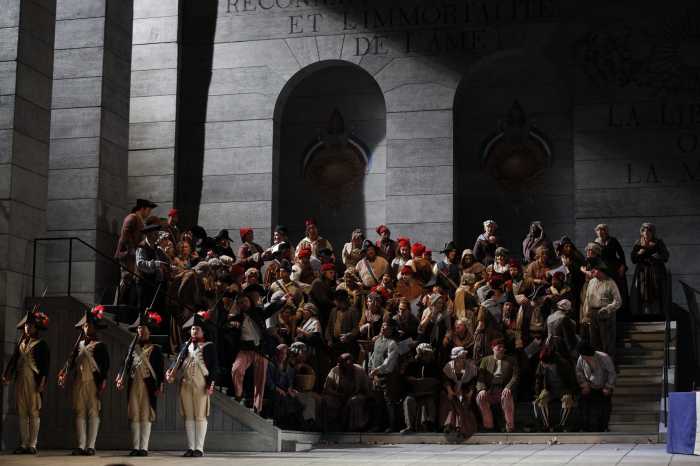‘Grand Horizons’ Delves Into Aging Generation

The most surprising thing about “Grand Horizons,” the Second Stage Theater’s premiere at the Helen Hayes, is the timing. A typical bourgeois comedy, it harkens back to the Boulevard Theater of late 18th-century Paris.
Indeed, the satiric edge and simply drawn characters feel like they’re at a different cross road in society — one that isn’t burdened by the political state of things.
That the characters are easy to understand and feel so recognizable is highlighted by the well-known actors who inhabit them. Jane Alexander portrays the scorned and scornful wife, James Cromwell her philandering husband, Priscilla Lopez his love interest and Michael Urie is the gay son. They’re joined by Ben McKenzie, the couple’s older son and his pregnant wife, played by Ashley Park.
Clint Ramos’s townhouse is unimaginatively square with a white interior, copper Jell-O molds lining the kitchen wall, and bright red handles all around for less mobile senior residents. The curtain gives us the Google map view of the community — little houses on a flat terrain that look all the same. Similarly, Linda Cho’s costume designs resemble the new arrivals rack at TJ Maxx.
Directed by Leigh Silverman, the comedy is aimed at the older generation, aging parents soon to be grandparents. However, Nancy (Alexander) is a wife and mother who missed every wave of feminism, never having had even a bank account in her own name. And her husband Bill (Cromwell) is a lame duck whose idea of adventure falls shockingly and benignly short. In spite of Brian’s (Urie’s) need to be the loyal son, his efforts land adorably off-color.
With such regular kinds of characters propelling the story, Lopez stands out for her heightened characterization of a woman on the make. Her high-pitched personality is enough to push the story over the edge. And McKenzie, a sublimely slick businessman, finds himself sandwiched between his aging parents and his pregnant wife.
It’s a refreshing production that resonates with playwright Bess Wohl’s award-winning earlier works. Among them, “Small Mouth Sounds” and “American Hero,” the latter also produced by Second Stage and directed by Silverman.
Here again, we meet sympathetic characters, seeking connection and dealing with the problems of an ever-changing world. It’s a gentle comedy finished with Hollywood gloss.
17 Minutes
If you think the problem of gun violence can be resolved in “17 Minutes,” you’re probably more of a cynic than an optimist. In Scott Organ’s new play at The Barrow Group that, ostensibly, is the issue posed.
At the center of it, Deputy Andy Rubens, played vulnerably by Larry Mitchell, is the cop on the high school security beat, just the way he has been for most of his career. The play opens after a student has killed 18 people.
Sitting in the precinct, Detective Morris interrogates the cop about the events that occurred during the 17 minutes he stood outside the wall where kids were getting shot. Brian Rojas’s delivery is direct, quietly flabbergasted, and ultimately stunned by the cop’s inability to act.
Directed by Seth Barrish, it’s a fast-paced scene much like we’re accustomed to watching on “Law and Order” or any number of cop shows. But there are questions the cop can’t answer.
What did he do in the 17 minutes between calling the police and entering the high school after the disaster had taken place? Couldn’t he have moved faster? And would that not have saved all those lives?
The strength of the production resides in the humanity of the characters, and in the credibility of a handful of actors who together build an intense rhythm. It’s gripping to watch.
As portrayed by DeAnna Lenhart, Samantha Rubens is an emotionally wounded wife who is all too aware of her husband’s plight. Sadly, her efforts to be supportive appear to him as an indictment.
Michael Giese plays the father of the shooter, a beer drinking blue collar guy with a collection of guns around the house. Those include the assault rifle his son carried to school that day he killed 18 people.
But the character who drives home the play’s moral is the mother of a deceased teenager who is well aware that 17 minutes isn’t the time needed to protect children from gun violence. “No one is equipped to deal with this sort of thing. Not anymore.” Cecilia tells the suicidal cop, “It’s too big. A child with an assault rifle. It’s too big.” Lee Brock is poignant in a role in which no one could ever imagine themselves.
Known for directing Mike Birbiglia’s one-man comedy shows, from “Sleepwalk with Me” to his latest, “The New One,” Barrish consistently demonstrates the ability to bring simple human moments truthfully to life. As much as Birbiglia is an everyman who we identify with, the character Deputy Ruben in “17 Minutes” is simply a guy who thought he could help people. He’s an innocent who has never once used his gun on duty.
Performed in a small space with minimal set pieces that are moved in real time to create the environments of home, school, and the precinct, the production is lean and unembellished. Organ’s drama simply and clearly addresses the state of gun violence across America and the casualties of violence.









